Economic Sanctions and the Russian Economy
Makoto Onozuka
There are no signs that Russia's aggression on Ukraine will stop in a short time for some economic reasons. Since the start of its military invasion on February 24, 2022, Western nations have imposed unprecedented sanctions against Russia. These sanctions encompass financial and trade-related measures, asset freezes, and transaction bans that the sanctioning states and regional organizations unleashed against specific Russian organizations, banks, and individual government/corporate personnel. Additionally, sanctions have extended to third-country companies involved in evading sanctions and supporting Russia. In 2024, the West took further measures to monitor the maximum price of Russian crude oil and prevent the circumvention of current sanctions. Russia has responded to Western sanctions by implementing countermeasures, including stricter foreign exchange controls and amendments to laws and regulations that allowed the Russian government to resort to financial transaction restrictions and asset freezes for foreign companies and individuals.
It seems that Russia is adjusting to those Western sanctions. From an economic standpoint, Russia's economic slowdown in 2022 was smaller than initially expected by international organizations. The size of the Russian economy in 2023 also registered significant growth, surpassing pre-invasion levels. On the diplomatic and trade fronts, Russia is strengthening its ties with economic powerhouses like China and India without becoming isolated from the international community. Additionally, Russia is looking to expand its diplomatic and trade relations with developing and emerging countries in Asia, Africa, and Latin America. Industrial and technological dependence on the West is compensated for by parallel imports, domestic production promotion, procurement from friendly countries, and technology transfer. There is a shortage of highly skilled labor, especially engineers, which may potentially impede the Russian economy and affect its invasion efforts. However, at present, the Russian economy is still growing, and since the Russian government is taking countermeasures, the labor shortage is unlikely to contribute to an immediate halt of the invasion.
1. Overall Picture of the Russian Economy
In 2022, Russia suffered an economic slowdown when its invasion of Ukraine began, but it was not as severe as initially predicted by international organizations. Surprisingly, the Russian economy in 2023 achieved a significant growth, surpassing its pre-invasion size. The Russian Federal State Statistics Service reported a 1.2% economic contraction in 2022, due primarily to Western sanctions and foreign companies' cessation of business activities in Russia. In defiance of those adversities, however, the Russian economy of 2023 fared better than predicted by international organizations and registered a real GDP growth rate of 3.6%.
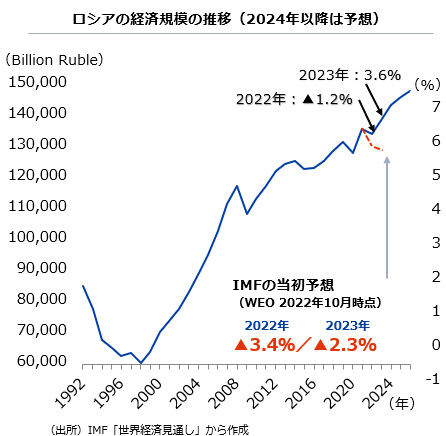
Since the second half of 2022, international financial institutions such as the International Monetary Fund (IMF), the Russian Ministry of Economic Development, and the Central Bank of Russia have repeatedly revised upward their economic growth forecasts for Russia. The IMF's latest GDP growth forecasts for Russia are 3.2% for 2024 and 1.5% for 2025 (July 16, 2024). The World Bank predicts 2.9% for 2024, 1.4% for 2025, and 1.1% for 2026 (June 11, 2024). The Russian Ministry of Economic Development also forecast a 2.8% growth for 2024 and a 1.6-2.3% for 2025 and 2026, respectively (April 26, 2024). Elvira Nabiullina, the Governor of the Central Bank of Russia, pointed to Russia's robust consumer demand, strong investment, and vibrant labor market in her 2024 economic outlook. (April 26, 2024).
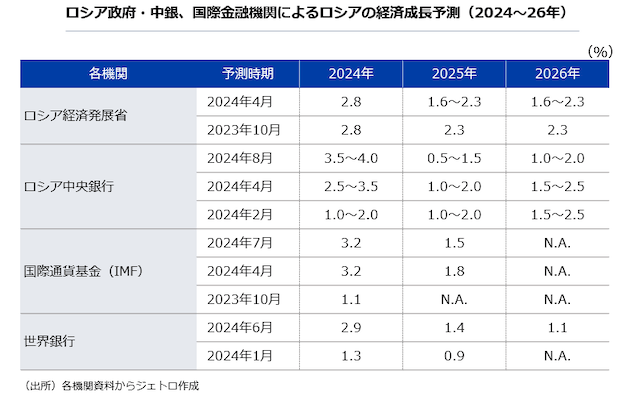
The strong Russian economy in 2023 is explained by the fact that, amid a tight labor market, a large-scale economic stimulus package, solid investment, and rising real wages were combined to improve consumer sentiment and to expand consumer loans, thereby serving to recover the economy, particularly consumption. Additionally, energy resource prices that lingered relatively high from the second half of 2023; increased demand in some manufacturing industry sectors due to the invasion of Ukraine; the expansion of parallel imports and of the import of products from businesses in friendly countries, and the restructuring of the supply chain were combined to resume product supply, ultimately leading to a recovery in both retail and manufacturing industries that had been sluggish since the start of the invasion. Looking at the Russian economy of 2023 by economic activity, growth was notable in manufacturing (up 6.9% year-on-year), construction (up 6.6%), wholesale, retail, and vehicle repair (up 6.6%), and finance and insurance (up 8.7%). The manufacturing industry, accounting for approximately 24% in the contribution ratio, served as the driving force for the economic growth. By product category, metal products, computers, electronic and optical equipment, and transportation equipment other than automobiles were notable contributors to this growth.
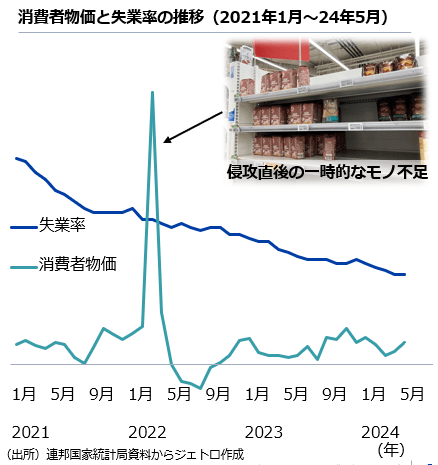
In 2024, demand is surpassing supply due to increased government spending, rising wages, and robust investment and personal consumption, boosted by an increase in lending to corporations and individuals by financial institutions. Military-related demand is also contributing to the economy. On the other hand, there is a challenge of suppressing inflationary pressure due to labor and supply shortages. Nonetheless, the Russian economy will likely remain stable in the short term.
In terms of industry, Russia's traditional dependence on mining is decreasing, while the economy is being propelled by increased production in key industrial sectors such as manufacturing industry and by unabated consumer spending. According to a Russian Federal State Statistics Service report dated June 14, real GDP growth rate in the first quarter of 2024 was a stable 5.4% compared to the same period of the previous year, contributed to by, among other sectors, manufacturing industry. In terms of economic activities, mining registered a 1.1% increase, manufacturing an 8.8% increase, agriculture a 1.2% increase, construction a 3.5% increase, retail sales a 10.4% increase, and transportation a 0.9% increase.
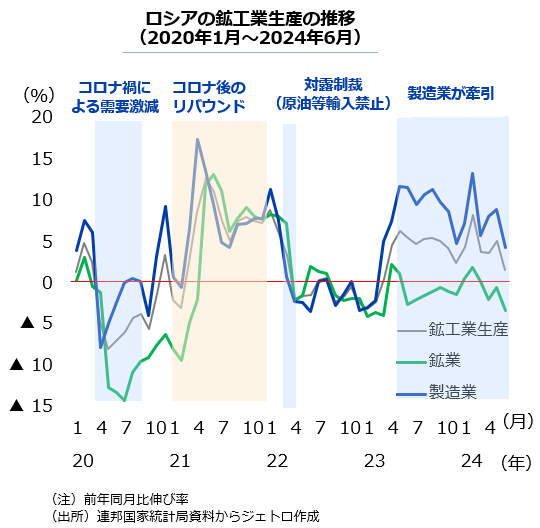
Real wages showed a gradual recovery from the fourth quarter of 2022 and remained positive during 2023. This sudden recovery is due to a backlash from the previous year's decline, as well as the slowdown of inflation that rose between 2022 and early 2023 and wage increases resulting from labor shortages. Consumer demand exceeding supply and labor shortages are still continuing in 2024, and real wages have increased 11.0% in the first quarter and 10.1% in January-May.
The unemployment rate did not rise sharply as was feared at the beginning of the invasion. It lingered around 5% throughout 2021 but dropped to 4.0% and 3.2% throughout 2022 and 2023, respectively. It has lowered to 2.6% as of May 2024. This is due to demand significantly surpassing supply as consumption and investment demand recover, and serious labor shortages that persist in industry. The employment situation has deteriorated, particularly regarding occupations requiring high levels of expertise and in industrial sectors that depended on international trade.
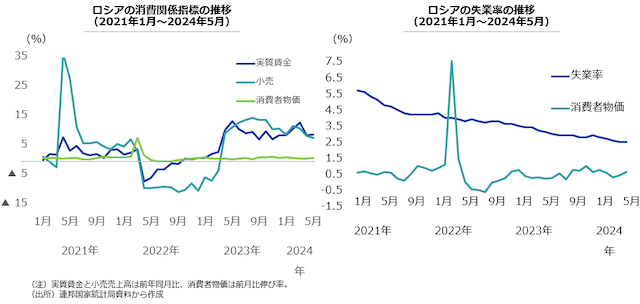
Most recently, the ruble is stable after the following fluctuations. Before the invasion, its exchange rate was around 80 rubles per dollar. In the wake of the invasion, it began to fall due to the impact of sanctions imposed by Western nations, and on March 11, it fell sharply to 120 rubles per dollar. However, due to the Russian government's currency defense measures from April 2022, the Russian central bank's monetary tightening, and high international resource prices, it recovered to 51 rubles per dollar on June 30. Since then, the ruble has gradually weakened; this is due to the relaxation of exchange and capital controls such as the forced sale of foreign currency by the Russian government and the Russian Central Bank; the recovery of foreign currency demand due to increased imports brought about by the restoration of supply chains; the fall of crude oil prices, and the Russian Central Bank's maintaining a low policy interest rate. The combination of these led to a downward trend in the ruble exchange rate. Looking at changes in the policy interest rate, the Russian Central Bank raised the policy interest rate from 9.5% to 20% in February 2022, immediately after the invasion. Afterward, as the Russian currency stabilized, the Russian Central Bank lowered the policy interest rate step-wise from April 2022 and kept it at 7.5% from September 2022 to July 2023. During this period, the continued low consumer price inflation, coupled with the external environment under the influence of sanctions, significantly restricted Russia's economic activity. Later, with rises in real wages and a recovery in consumer demand as background, inflationary pressure gradually increased due to the rapid expansion of domestic demand exceeding supply and the depreciation of the ruble caused by increased imports; the Russian Central Bank shifted to the step-wise raising of the policy interest rate from July 2023.
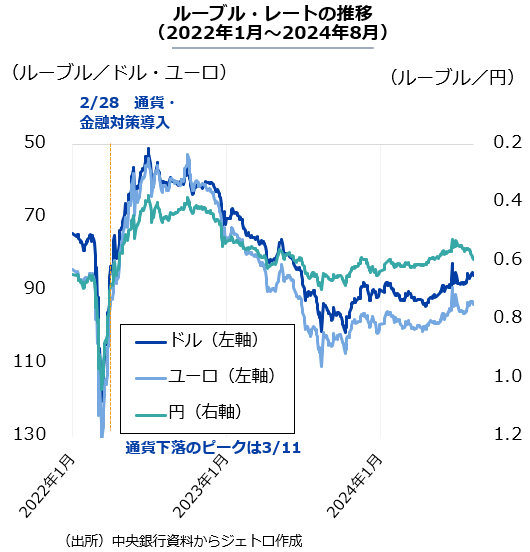
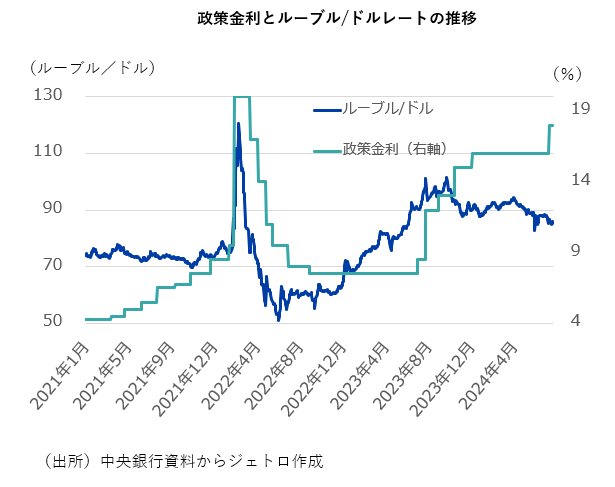
One of the economic reasons why Russia is carrying on the invasion may be the trading price of crude oil, which accounts for almost 30% of the nation's revenue. Crude oil is a means of raising revenue and acquiring foreign currencies to finance the current war in Ukraine; if the price of Russian Ural crude oil continues to remain below the government's anticipation, the result will likely have an impact on the war efforts. Before the invasion, Ural crude oil carried similar prices to North Sea crude oil. However, once the invasion began, the prices of both crude oils continued to hike due to concerns about the stagnation of Russian oil supplies. On March 8, 2022, the United States and the United Kingdom banned imports of Russian crude oil, causing the price of North Sea crude oil to reach $133 per barrel and that of Ural crude oil to reach $111 per barrel, widening the price gap to $22. Subsequently, Ural crude oil price fell to $69.8 on April 7, widening the price gap with North Sea crude oil to as much as $30. On May 30, the EU imposed a ban on crude oil imports from Russia, except those through pipelines. On September 1, North Sea crude oil and Ural crude oil were devalued to $92 and $74 per barrel, respectively, with their price gap diminishing to $19. At that time, crude oil prices dropped due to concerns about global recession. Under these circumstances, the "Price Ceiling Coalition," involving the G7 countries, the EU, and Australia, set the upper limit price for sea-borne Russian crude oil imports at $60 per barrel from December 5, aiming to limit Russia's oil revenues.
In response to the plummeting crude oil prices in the global market, OPEC Plus group (OPEC and major non-OPEC oil-producing countries like Russia) implemented, from November 2022, a production cut of 2 million barrels per day. From April 2023, the price gap between Ural crude oil and North Sea crude oil decreased to less than $20 and in February 2024 was narrowed to $10 or under.
Ural crude oil price was assumed to be $71.3 in the 2024 Russian federal budget draft but was revised to $65.0 in April 2024. As of July 29, 2024, North Sea crude oil price was $80.94, and Urals crude oil price $79.87. Their fall below these assumptions would have a negative impact on the Russian federal budget and foreign currency earnings, which would in turn affect Russia's invasion efforts. The OPEC Plus group held the 55th Joint Ministerial Monitoring Committee (JMMC) on August 1 and, as decided before the 37th Ministerial Meeting (June 2024), agreed to maintain until the end of 2025, the daily production cut of 2 million barrels since November 2022 and an additional voluntary daily production cut of 1.66 million barrels announced by several member countries in April 2023. Oil prices have been on a downward trend since mid-April 2024, but have seen a temporary rise since early June when OPEC decided to extend its production cut policy. Russia's oil and gas revenues were stable as of the end of May 2024. As long as the production cut agreement continues, Russia's finances will likely remain stable at a low level.
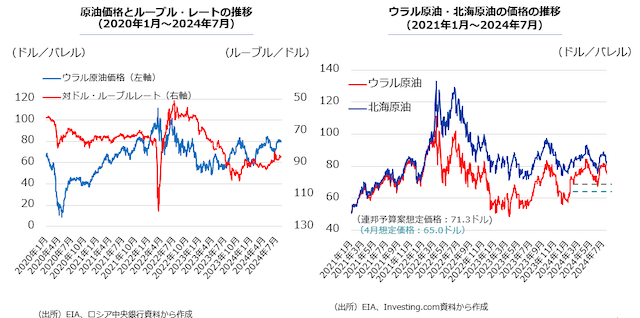
In 2023, Russian federal revenues increased by 4.7% year-on-year to 29,124.1 billion rubles (approximately 49,511 billion yen, with 1 ruble equaling 1.7 yen), mainly from non-oil and gas sources. Expenditures increased by 4.0% year-on-year to 32,353.7 billion rubles, leading to a fiscal deficit of 3,229.7 billion rubles. The fiscal balance as GDP percentage was 1.9%, down 0.2 points from the previous year. As of the end of May 2024, revenues have increased by 45.5% year-on-year to 14,289.5 billion rubles, whereas expenditures have also increased by 18.9% year-on-year to 15,272.2 billion rubles, resulting in a fiscal deficit of 982.8 billion rubles. Looking at the breakdown, oil and gas revenues have increased by 73.5% year-on-year to 4,951 billion rubles, while non-oil and gas revenues increased by 34.1% year-on-year to 9,338.4 billion rubles; value-added tax (VAT) increased by 23.4% year-on-year to 3,383.9 billion rubles, and import-related tax revenues increased by 15.1% year-on-year to 2,374.4 billion rubles. "Other taxes" (export tariffs excluding oil and gas exports, dividends from state-owned enterprises, recycling taxes, etc.) increased 2.2 times year-on-year to 2,976 billion rubles, contributing to the overall increase in tax revenues. The deficit has decreased compared to the fiscal deficit of 3,295 billion rubles at the end of the same month of the previous year. The fiscal deficit for 2024 is estimated to be 2,120 billion rubles; as GDP percentage, it is expected to be 1.1%, down 0.8 points from 2023.
Looking at Russia's foreign exchange reserves and the National Welfare Fund, as of the end of June 2024, the former were worth $593.5 billion, the latter $147 billion, totaling approximately $740.5 billion. The National Welfare Fund, a government-affiliated fund serving as emergency resources, is used to cover the budget deficit. By June 2024, Western nations have frozen approximately $300 billion of the Russian Central Bank assets. The National Welfare Fund has been on a downward trend because it has been allocated to cover the budget deficit since the 2022 invasion and because its source, oil and gas revenues, registered a sluggish growth in 2023. If the liquid portion of the National Welfare Fund is about half, the actual balance of the fund and the foreign exchange reserves is considered to be less than $350 billion. If the fiscal deficit remains at the same level as recently, or around 3 trillion rubles (approximately 32.9 billion dollars, 1 dollar = 91.3 rubles), and if the fiscal deficit fails to be covered by government bonds or other means, Russia appears to possess funds to continue the invasion of Ukraine to some extent, given the above balance.
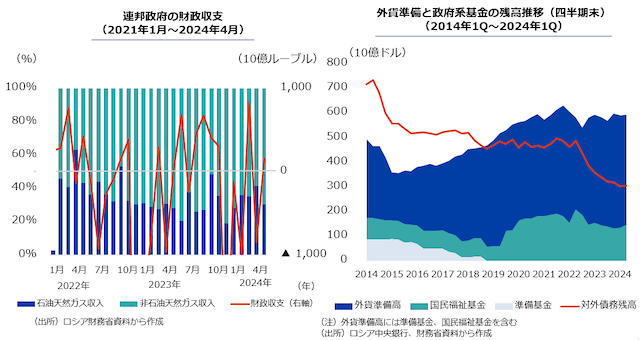
2. Foreign Policy and Trade
When it comes to Russia's foreign policy and trade, Russia is strengthening cooperation with emerging and developing countries on the economic front such as finance, transportation, trade, and IT. It is also deepening its ties with intergovernmental associations such as the Shanghai Cooperation Organization and the Eurasian Economic Union, aiming at cooperation not only on the economic but also on the regional security front. As the trade surplus continues and friendly countries are supplying goods necessary for Russian industry, there are at this moment no signs that Russia will stop the invasion of Ukraine for some economic reasons associated with foreign relations and trade.

As for Russian trade, exports to Asia have increased, but they have not yet compensated for decreasing exports to Europe. Russia's trade statistics from 2023 to May 2024 reveals that trade with Asian countries is on the rise, while imports from Europe of pharmaceuticals and some machinery and equipment, which are not subject to sanctions, continues. Russia is entering into various markets in Asia, the Middle East, Africa, and Latin America, focusing on exports of non-resource and non-energy products.
Russia's trade structure basically depends on the export of resources and the import of machinery, and this trend remained intact in 2023. According to the Federal Customs Service, Russia's exports amounted to $425.088 billion, down by $167.399 (28.3%) from the previous year, while imports amounted to $285.057 billion, up $29.752 (11.7%) from the previous year. The result was a trade surplus of $140.031 billion. The trade surplus diminished from $337.182 billion in the previous year due to a 30% decrease in the value of exports of mineral fuels, Russia's major export item, from the previous year.
Looking at Russia's exports by destination region, the value of exports to Europe decreased by $180.696 billion, while exports to Asia increased slightly to $16.189 billion (5.6%) from the previous year. Yet, the share of exports to Asia registered a significant increase from 49.0% to 72.1%, whereas that to Europe decreased from 44.8% to 20.0% due to a massive decline in exports of energy resources.
Asia became Russia's largest trading partner region, with a share of 65.8%. Europe's share was 27.5%, down 7.5 points from the previous year. Regarding item-wise exports, mineral products, metals and related products, and food and agricultural products ranked high, as in previous years. Mineral products accounted for 61.2% of the total exports. Machinery and equipment and transport equipment accounted for 51.1% of the total imports. No significant change was noted in the composition of export and import items from previous years.
Since 2022, Russia has not released detailed trade statistics. To obtain information about Russia's exports and imports by country and region, it is necessary to consult trade statistics published by export/import countries. China, Russia's largest trading partner, profited by a significant increase in exports to Russia, particularly transport equipment. China's exports to Russia, represented by machinery including transport equipment, rose by 46.1% year-on-year to $111.4429 billion, while imports from Russia increased by 13.7% year-on-year to $127.62749 billion. EU exports to Russia decreased by 28.8% year-on-year to $41.28312 billion, and EU imports from Russia also decreased by 75.5% year-on-year to $48.04947 billion.
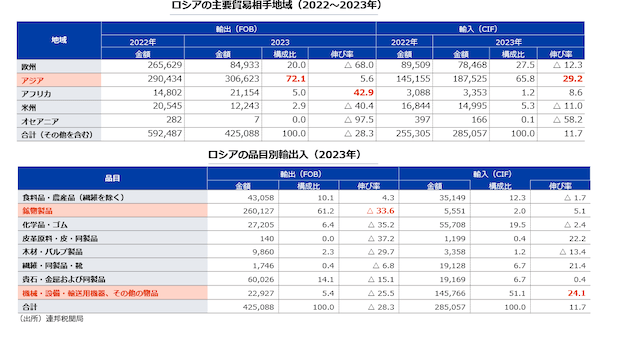
In January-May 2024, Russia's exports totaled $172.085 billion, marking a drop of $1.01 billion (0.6%) compared to the same period in the previous year; Russia's imports amounted to $107.831 billion, reflecting a decline of $1.0 billion (8.5%) from the same period in the previous year. The result was a trade surplus of $64.254 billion. The export value of mineral fuels, Russia's major export item, increased by 2% from the previous year. Meanwhile, exports of "food and agricultural products (excluding textiles)," "precious stones, metals and related products," and "machinery, equipment, transport equipment, and other goods" saw slight decreases. Overall, the trade surplus increased by $9 billion year-on-year.
By region, Asia accounted for 75.8% (68.5% for the previous year) of total exports from Russia. The share of Russian exports to Europe was 15.1%, down 8.9 points from the previous year. However, in terms of value, exports to Asia in January-May 2024 were only slightly higher by $11.959 billion (10.1%) compared to the previous year, which was not enough to make up for a decrease in exports to Europe ($15.496 billion). Imports from Asia accounted for 66.6% (43.3% for the previous year) of the total imports. Europe's share was 26.5%, up 6.7 points from the previous year.
As for item-wise exports and imports, the top exports were dominated by mineral products, metals and related products, and food and agricultural products, similar to previous years. The value of mineral products, textiles, and related products, and shoes increased compared to the previous year. Mineral products accounted for 62.6% of the total exports, while machinery and transportation equipment accounted for 50.6% of the total imports. The composition of exports and imports did not differ from previous years, with a continued trend of exporting resources and importing machinery during January-May 2024.
3. Russia's International Transactions and Business Activities Affected by Sanctions
The withdrawal of foreign companies and declining investment will directly impact the Russian economy. Initially, there were concerns that the large-scale departure of Western companies from the Russian market and the cessation of their business activities would significantly affect employment, technology transfer, production capacity, and consumer life in Russia. However, Russia is overcoming these challenges by expanding domestic production, promoting parallel imports, and increasing trade with friendly countries.
Sanctions against Russia, mainly imposed by the West such as G7 member states, can be broadly divided into financial, trade, and individual/organizational sanctions. Among financial sanctions are the exclusion of major Russian banks from the Society for Worldwide Interbank Financial Telecommunication (SWIFT), the restriction of transactions, and the immobilization of assets of the Russian government, companies, and individuals. Trade sanctions ban the export of specific technologies and products to Russia and the import of Russian oil and gas. Sanctions against individuals and organizations include travel bans on Russian government officials and wealthy individuals, and asset freezes on organizations. Since the turn of 2024, the West has applied more rigorous monitoring of compliance with price ceiling regulations regarding Russian crude oil trade, which were introduced concertedly in December 2022. Furthermore, the West has introduced sanctions targeting third-country companies involved in helping Russia to circumvent sanctions and supporting it. In addition, some industrial sectors in the West, which handle products other than those subject to sanctions, have voluntarily decided to withdraw from or suspend Russian-related businesses in consideration of reputation risks.
Russia's countermeasures since February 28, 2022 include obligatory ruble transactions, mandatory conversion to rubles, laws allowing financial transaction restrictions and asset freezing for foreign companies and their expats in Russia, laws allowing temporary government control of companies, laws allowing restrictions on the rights of foreign shareholders, export restrictions and import expansion measures to ensure domestic demand, and foreign exchange controls obliging specific transactions, such as agricultural products, to be conducted in rubles. Restrictive measures against the departure of foreign capital stipulate restrictions on the repurchase of businesses by departing foreign companies. In August 2023, issuing a presidential decree, Russia unilaterally suspended part of the effectiveness of tax treaties with 38 countries, including Japan. In May 2024, Russia released countermeasures against the US seizure of Russian assets.
In this situation, many Western companies have announced their withdrawal from the Russian market and their plans to liquidate their businesses and assets in Russia. This trend continued from 2023 through the first quarter of 2024. According to the Russian Central Bank's direct investment statistics (balance of payments basis, net cash flow), inward direct investment in 2023 was $11.133 billion; as of the first quarter of 2024, there was a withdrawal surplus of $5.565 billion. The inward direct investment balance has been declining since the Russian invasion of Ukraine due to the departure of Western companies. At the end of December 2023, it was $333.714 billion, a 24.5% decrease from the end of the previous year; at the end of March 2024, it was $317.931 billion, 21.8% down from the same month of the previous year. The Russian Central Bank has failed to publish statistics by country/region and industrial sector since 2022.
While Western companies continue to leave Russia, companies of "friendly countries" are making investment in Russia. Examining cross-border mergers and acquisitions worldwide, Russian companies were targeted in 22 cases. The acquiring companies were primarily located in friendly nations such as the UAE, Armenia, India, Kazakhstan, Puerto Rico, Turkey, and China.
Taking the new passenger car market for example, Western car manufacturers stopped production and left. In the meantime, Chinese- and Russian-made cars are increasing in sales number, filling the vacuum left by the departure of Western companies. A similar trend is visible for consumer goods and restaurant/eatery services. As Western companies leave, the scarcity of consumer goods is slowly addressed by, for example, import substitution industrialization.
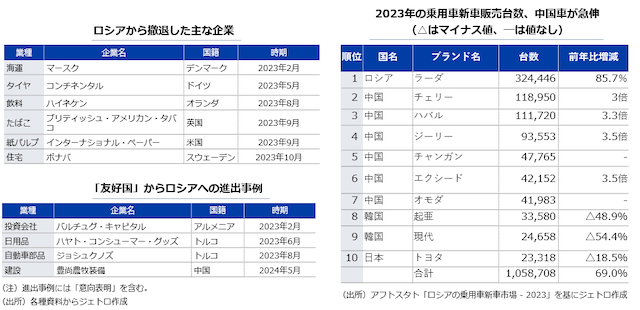
4. Industry and Technology
The development of the Russian economy has depended in part on the industries and technologies of Western nations; the lack of Western goods and technology due to sanctions is a major problem for the Russian economy. However, given that Russia is addressing this problem with substitutes imported from China and through the expansion of domestic production, there is little likelihood that this particular problem will contribute to stopping the Russian invasion.
In response to sanctions by Western nations, Russia has restricted foreign, including Western, companies in Russia in reclaiming equipment and withdrawing or selling businesses. Items subject to export ban effective until December 31, 2025 include, among other things, production equipment imported to Russia. Most items falling under categories 84 to 90 of the Eurasian Economic Union's Single Commodity Nomenclature of Foreign Economic Activities (EEU TNVED Code) are subject to this export ban.
To avoid a shortage of necessary goods at home, Russia issued Ministry of Industry and Trade Order No. 1532 of April 19, 2022, which approved a list of brand names and goods for which parallel import to Russia is authorized; Russian domestic companies can now procure sanctioned goods from sources other than authorized dealers. A survey on about 1,000 companies conducted by the Gaidar Institute for Economic Policy, a Russian policy think tank, in January 2023 found that sanctioned products from Western manufacturers that had withdrawn from the Russian market were replaced with Chinese or domestic products. According to a questionnaire survey (multiple answers) conducted by the same institute about substitutes for sanctioned imports, 67% of respondent companies answered that they "use Chinese products," 39% "use Russian products," 23% "use similar products from other countries," 21% "use products from the EAEU," and 15% "sanctioned imports." Regarding spare parts, 63% of respondents answered they "use Chinese products," 46% "use Russian products," 24% "use similar products from other countries," 20% "use products from the EAEU," and 11% "sanctioned imports." Respondent companies also procure goods, small as the quantity is, from friendly countries such as India and Iran. Sanctioned products are mainly procured through Chinese companies and Russian dealers (February 7, 2023).
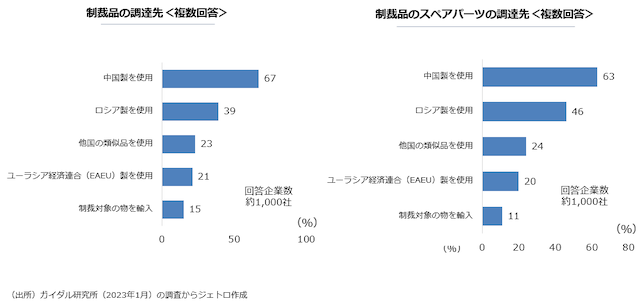
The Russian government is strengthening domestic advanced technology and high-tech industry so that domestic companies can secure new sources of procurement at home. Federal Government Directive No. 1315-r of May 20, 2023 set the goal of securing by 2030 an independent scientific, human, and technological base featuring crucial and cross-cutting technologies, thereby securing the production of semiconductors and other high-tech products, of which at least 75% to be produced at home. In addition, President Vladimir Putin announced on February 29, 2024 that imports, which currently account for approximately 19% of Russia's GDP, should be reduced to 17% or less by 2030. On the other hand, Alexey Vedev, Head of the Financial Studies Department of the Gaidar Institute, stated, "As for high-tech industrial products manufactured in the West, it is either impossible or extremely problematic to find adequate substitutes for them in Russia… either we will have to look for analogs in the countries of Southeast Asia or try to import original equipment to Russia from the same Europe to circumvent sanctions." (The Gaidar Institute, March 2, 2024).
While imports from Western countries have decreased significantly, China's exports of machinery to Russia have increased. Looking at trade statistics on machinery and other items (HS codes 84-90), exports from Western countries to Russia have decreased significantly since 2022, while exports from China to Russia have increased. China's exports to Russia in 2023 were $68.768 billion (up 73.5% from the previous quarter), the EU $9.911 billion (down 50.4%), Japan $2.223 billion (down 41.9%), the United States $221 million (down 75.4%), and Canada $8 million (down 93.1%). The EU's exports to Russia in 2023 exceeded Japan's exports to Russia before the Russian invasion. According to Bloomberg, Russia imported 450 million euros of sanctioned goods from some EU member states in January-September 2023 (February 26, 2024). Looking at the breakdown of machinery exported from China to Russia, of categories 84-90, categories 84, 85, and 87 account for 90%. Exports to Russia in 2024 are accounted for by $32.064 billion from China (January-June, up 1.4% from the same period of the previous year), $2.858 billion from the EU (January-May, down 42.0%), $751 million from Japan (January-June, down 47.0%), $55 million from the United States (January-May, down 57.3%), and $3 million from Canada (January-May, down 55.7%).
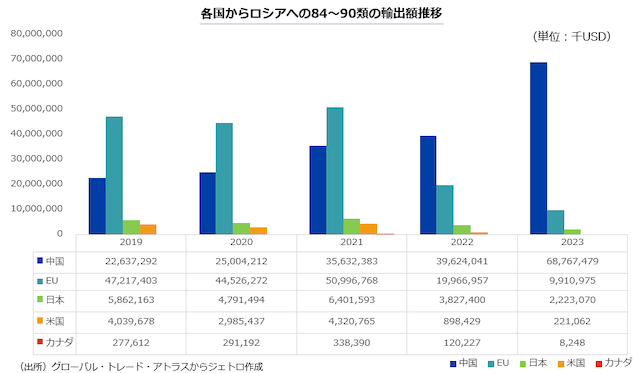
5. Labor Issues
Russia faces a grave labor shortage, but in the short term, this shortage seems to be far from dissuading Russia from the invasion of Ukraine. Russia's labor shortage is due to the continued demand over supply in the wake of the invasion and to the population decline and aging that had prevailed from before the invasion. It may be also contributed to by the mobilization of 300,000 people, the subsequent increase in volunteer soldiers, and the exodus of more than 100,000 people, including IT talents. Above all, there is a shortage of highly skilled personnel to support industry, and if the current situation continues, labor shortage will likely stagnate the Russian economy and affect Russia's invasion efforts. On the other hand, the Russian government has embarked on improving labor productivity, securing foreign workers, and nurturing high-skilled personnel, but it will take time for these efforts to yield results.
Russia is facing the challenges of population decline and aging. The Higher School of Economics (HSE) of Russia points out that in Russia, the sum of people aged 20 to 59 will reach 76.3 million in 2035, a 12% decrease from 2015, which could have an adverse impact on the economy and labor market.
A partial mobilization order in September 2022 resulted in the mobilization of 300,000 people plus tens of thousands of volunteers. President Putin stated on December 14, 2023 that 468,000 people had been secured. However, given that this number represents only about 0.6% of Russia's working population in 2022-23, its impact, if combined with the exodus of citizens, on the Russian economy seems to be limited. According to the Federal State Statistical Service, the labor force at the end of 2022 was 72.644 million, up 346,000 from the previous year, and 73.636 million in 2023 (up 992,000). While more than 100,000 people reportedly left the country to avoid mobilization, the number of foreign workers has increased. Migrant workers from former Soviet countries in, for instance, Central Asia are working in Russia; the number of foreign workers, which decreased amid the COVID-19 pandemic, is now recovering. The number of foreigners who entered Russia to find jobs in 2022 was 3.47 million, an increase of 871,000 from the previous year (FinExpertiza, February 20, 2023). In 2023, about 4.5 million foreign workers entered Russia, a 30% increase from the previous year; their number is expected to increase. Furthermore, the Russian government is implementing a project to increase the number of foreign workers through an immigration promotion program that provides tax-related preferential treatment to foreign workers including immigrants (Izvestia, June 13, 2024).
In 2024, the Federal State Statistics Service predicts that the unemployment rate will stay below 3%, the lowest since the data collection began in 1999. Nonetheless, labor shortage is imminent in Russia. Putin mentioned a shortage of about 2.5 million workers, particularly in the manufacturing and construction industries (TASS, February 20, 2024). On February 29, 2024, he announced a national project "Human Resources," which is focused on increasing employment and creating high-skilled personnel by updating educational programs to provide human resources for industries such as aviation, shipbuilding, pharmaceuticals, electronics, and defense. Its goal is to nurture approximately one million professional experts in these fields by 2028.
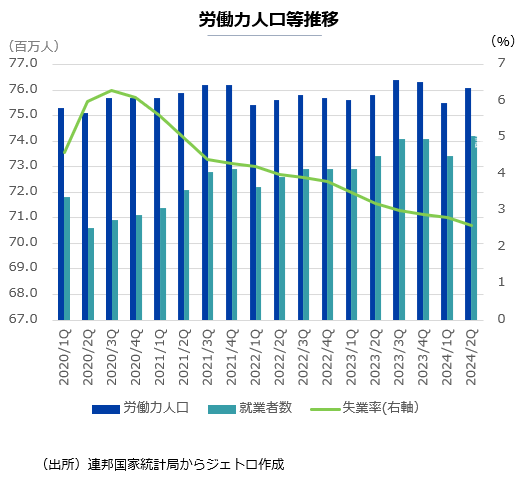
Elvira Nabiullina, the Governor of the Central Bank of Russia, has announced that it would take time to confirm the effects of these labor measures. She also pointed out that labor and production capacity are tight, and that labor shortage could cause grave economic stagnation and accelerate inflation. Many Russian companies are making investment in productivity improvement and automation, but such efforts will take time to bear fruit. Since the cost of purchasing equipment is also rising due to high inflation and sanctions, Russian companies' ability to improve productivity is also declining. Governor Nabiullina said that supply could not keep up with growing demand, and that high inflation and cost hikes will force adjustments to investment projects (July 26, 2024).
At present, there is a shortage of high-skilled personnel and other laborers, and low economic growth is expected to continue until 2026. The Russian government is working hard to nurture high-skilled talent. In the short term, the shortage of labor and high-skilled talent will, nonetheless, not contribute to stopping the Russian invasion of Ukraine.
(Research Manager, Japan External Trade Organization)
- February, 2026, "The Impact of Russia-North Korea Military Cooperation on Regional Security" by Narushige Michishita, Vice President, National Graduate Institute for Policy Studies
- February, 2026, "The Sino-Russian Strategic Partnership and Japan's Security: Future Trajectories and Implications" by Shinji Yamaguchi, Senior Fellow, National Institute for Defense Studies
- February, 2026, "A Perspective on Russia's National Security Strategy: Focusing on the ‘Multipolar World,' ‘Anti-Westernism,' and ‘Nuclear Status'" by Shinji Hyodo, Vice President for Academic Affairs, National Institute for Defense Studies
- February, 2026, "The Possible Revival of "Imperial Russia" and What It Means for Asia and Japan" by Akio Kawato , Former DCM, Embassy of Japan in Russia
- February, 2026, "Russia After the Ukraine War: A Challenge to Japanese Security Strategy" by Matake Kamiya, Professor, The National Defense Academy
- January, 2026, "The Future of US-Russia Relations under Trump 2.0: Implications for Japan" by Taisuke ABIRU, Senior Research Fellow, the Sasakawa Peace Foundation
- January, 2026, "Hybrid Warfare Transformed Amidst the Ukraine War: Russian Tactics and the Global Diffusion of Threat" by Yoko HIROSE, Professor, Keio University
- October, 2025, "The End of Pax Americana and the Rise of China" by Nobuhiko Tamaki, Ph.D. Professor, Chuo University
- October, 2025, "China's "Kill ‘Three' Birds with One Stone" Approach to Deep-Seabed Resource Development" by Chisako Masuo, Professor, Kyushu University
- October, 2025, "Geopolitics of Science and Technology: China's Scientific Revolution vs. Trump 2.0" by Haruo Kurasawa, Science Journalist
- October, 2025, "China's Strategic Gains and Losses from the Ukraine and Middle Eastern Conflicts and Its Military Partnership with Russia" by Masafumi Iida, Director, Security Studies Department, The National Institute for Defense Studies
- October, 2025, "Medium- to Long-Term Prospects of the Chinese Economy" by Toshiya Tsugami, Director, Tsugami Toshiya's Works
- October, 2025, "China's Military Power as It Celebrates Its Centennial " by Bonji Ohara, Founder & Rep. Director, DEEP DIVE
- October, 2025, ""Pax China" from the Global South's Perspective" by Shin Kawashima, Professor, The University of Tokyo
- July, 2025, "What Makes Modi 3.0 Distinct and a Future Outlook" by Toru Ito, Professor, The National Defense Academy
- July, 2025, "Mid- to Long-Term Outlook for the Indian Economy: How to Assess the Indian Market―Benefits and Challenges of Japan-India Collaboration" by Go Yamada, Principal Economist, Japan Center for Economic Research
- July, 2025, "The India-China Border Issue and India's Military Strategy" by Satoru Nagao, Research Fellow, Hudson Institute
- July, 2025, "Where the India-Pakistan Conflict Is Headed" by Satoru Nagao, Research Fellow, Hudson Institute
- July, 2025, "India, a Leader in the Global South - What Is It Really Like?" by Tomoko Kiyota, Associate Professor, Nagasaki University
- July, 2025, "India's Diplomacy with the United States and Russia" by Mari Izuyama, Chief Research Fellow, National Institute for Defense Studies
- July, 2025, "Japan-India Security Cooperation in India's Grand Strategy" by Kazutoshi Tamari,Professor, Chukyo University
- July, 2025, "What's Next for Japan-India Strategic Partnership" by Kenji Hiramatsu, Former Ambassador to India
- April, 2025, "Outlook for the US Economy: Whether the "Golden Age" Is Beginning?" by Akihiko Yasui Director, Mizuho Research & Technologies, Ltd.
- April, 2025, "China's Economy Facing Internal and External Challenges" by Osamu Tanaka,Visiting Professor, Takushoku University
- April, 2025, "The Role of the Private Sector in Economic Security: Reflections from Japan-US and Public-Private Relations Perspectives" by Kohei Takeda Research Associate, Weatherhead Center for International Affairs at Harvard University
- April, 2025, "Proposal for Strengthening the Competitiveness of Japan's Defense Industry: Shift from the "Family Type" to the "Strategic Keiretsu-Type" System" by Yuzo Murayama Professor Emeritus, Doshisha University
- April, 2025, "Considering Economic Security Focusing on Food and Energy Security" by Takashi Sekiyama Professor, Kyoto University
- March, 2025, "An Outlook for the Japanese Economy" by Takao Komine, Visiting Professor, Taisho University.
- March, 2025, "Considering Social Security and Tax Reforms: What Will Become of Japan's Fiscal Reconstruction?" by Kazumasa Oguro, Professor, Hosei University.
- March, 2025, "Progress in Economic Security Policies and Further Strengthening of National Security Policy Integration Amid the Acceleration of "Securitization"" by Nobushige Takamizawa, Visiting Professor, The University of Tokyo.
- March, 2025, "From Economic Security to Geoeconomics" by Kazuto Suzuki, Professor, The University of Tokyo.
- January, 2025, "Healthcare Policy in the Second Trump Administration" by Takakazu Yamagishi Professor, Nanzan University.
- January, 2025, "Foreign and Security Policies of the Second Trump Administration" by Yuki Tatsumi Senior Fellow at the Stimson Center.
- January, 2025, "The Second Trump Administration and Japan-US Relations: Viewed by a Former Practitioner of Diplomacy" by Koji Tomita Former Ambassador to the United States.
- January, 2025, "The "FEAR" Returned: The Meaning of Trump's Reinstatement" by Koji Murata Professor, Doshisha University.
- December, 2024, "Analysis of the Trump Vote in the 2024 U.S. Presidential Election" by Takeshi Iida Professor, Doshisha University.
- December, 2024, "Trump's Victory Factors: Why Trump Wanted to Be President Again" byTsuneo Watanabe Senior Fellow, the Sasakawa Peace Foundation.
- December, 2024, "Kamala Harris and Factors Behind Her Defeat:Can the Democrats Make a Comeback?" by Masahito Watanabe Professor, Keio University.
- December, 2024, "American Democracy and Society Viewed from an Analysis of the 2024 US Presidential Election" by Takayuki Nishiyama Professor, Seikei University.
- October, 2024, "Assessment of Russia's Military Strength, Stockpiles, and Defense Production Base: Evaluating Russia's Capability to Continue Warfare" by Yu Koizumi, Associate Professor for RCAST, The University of Tokyo.
- October, 2024, "Germany's Arms Assistance for Ukraine: Has Its Culture of Self-Restraint Been Overcome?" by Norihide Miyoshi who served for The Japan News).
- October, 2024, "Russia's War Costs: Military Expenditures and Resource Allocation in "Wartime"" by Miho Okada, Professor, National Defense Academy.
- October, 2024, "Assessment of Russia's Military Strength, Stockpiles, and Defense Production Base: Evaluating Russia's Capability to Continue Warfare" by Yu Koizumi, Associate Professor for RCAST, The University of Tokyo.
- October, 2024, "Economic Sanctions and the Russian Economy" by Makoto Onozuka,Research Manager, Japan External Trade Organization.
- October, 2024, "Russia's Prolonged Military Invasion of Ukraine and Ukrainian Public Opinion: Focusing on Perceptions of Negotiations, Territory, and Sovereignty" by Tsuyoshi Goroku Associate Professor, Nishogakusha University.
- September, 2024, " The Russia-Ukraine War Viewed from War Termination Theory" by Yasuaki Chijiwa Chief Research Fellow, National Institute for Defense Studies.
- September, 2024, " How the Winter War Ended: A "Compromised Peace" Ends the Ukraine War?" by Tomoyuki Hanada Chief Research Fellow, National Institute for Defense Studies.
- September, 2024, " The End of the Soviet-Afghan War" by Takeshi Yuasa Professor, Sophia University Professor, Sophia University.
- July, 2024, " The Yoon Suk-yeol Administration and the ROK-Japan Relations" by CHOI, EunmiJ, The Asan Institute for Policy Studies, Research Fellow.
- July, 2024, " The 22nd National Assembly Election and South Korean Politics " by Hideki Okuzono, Professor, University of Shizuoka.
- July, 2024, " South Korea's Economic Security Policy and New Japan-ROK Economic Cooperation" by Satoru Okuda, Professor, Asia University.
- July, 2024, " Japan-ROK Cooperation: Not an Option but a Must" by Chey Tae-won, Chairman and CEO SK Inc.
- July, 2024, "Examining the Yoon Administration's Foreign Policy over the Past Two Years " by Junya Nishino, Professor, Keio University
- July, 2024, "North and South Korea Enter a New Phase of Competition" by Narushige Michishita, Executive Vice President and Professor at the GRIPS.
- July, 2024, "The Camp David Summit and U.S.-Japan-ROK Security Cooperation" by Yasuyo Sakata.
- April, 2024, "The Middle East Question and Japan" by Sinan Levent, Professor, Ankara University
- April, 2024, "The Israel-Hamas War and the Disruption of the Rules-Based International Order-Viewed from Theories of International Politics-" by Matake Kamiya, Professor, National Defense Academy of Japan
- March, 2024, " Regional Political Dynamics in the Middle East - Factors Changed and Remained unchanged after the October 7th Incident-" by Amane Kobayashi, Senior Researcher, the Institute of Energy Economics, Japan
- March, 2024, "The Ukraine War and Russia's Changing Middle East Diplomacy " by Taisuke Abiru, ,Senior Research Fellow, the Sasakawa Peace Foundation
- March, 2024, "Superpowers' Engagement with the Middle East and Their Intentions " (Edited lecture transcript) by Koichiro Tanaka, Professor, Keio University
- March, 2024, " Why the Israel-Hamas War Broke Out?" by Hiroyuki Suzuki, Professor, Associate Professor, The University of Tokyo
- March, 2024, " The Middle East Peace Process-Its Development and Future " by Chie Ezaki, Associate Professor, National Defense Academy of Japan
- March, 2024, "The Origin and Prospects of the Question of Palestine -Transformation of Israeli Politics and "10/7" as a Boiling Point- " by Aiko Nishikida, Professor, Keio University
- January, 2024, "Indonesia's Global South Diplomacy and Its Impact on Domestic Politics" by Jun Honna, Professor, Ritsumeikan University
- January, 2024, "Brazilian Foreign Policy and the Global South" by Hiroyuki Urabe, Professor, Dokkyo University
- January, 2024, "Africa's Population Explosion:How the "Last Frontier" Will Change the World" by Keiichi Shirato, Professor, Ritsumeikan University
- January, 2024, "The Impact of PM Modi's Global South Policy on the Military Strategy of India" by Satoru Nagao, Research Fellow, Hudson Institute
- December, 2023, "The Global South Concept and Its Historical Development and Outlook" by Ken Jimbo, Professor, Keio University
- December, 2023, "India's Global South Diplomacy and Japan" by Toru Ito, Professor, National Defense Academy
- December, 2023, "The Global South Viewed from China's Perspective" by Shin Kawashima, Professor, the University of Tokyo
- October, 2023, " Political and Social Divide in the United States and Challenges for Democracy" by Kazuhiro Maeshima, Professor, Sophia University
- October, 2023, " Has US Foreign Policy Doctrine Changed? " by Tsuneo Watanabe, senior Fellow, Sasakawa Peace Foundation
- October, 2023, " America's Journey to Hegemony and Its Challenges" by Koji Murata, Professor, Doshisha University
- September, 2023, " A Medium- to Long-Term Outlook for the US Economy―Can America Win the Competition with China?―" by Tatsuhiko Yoshizaki, Chief Economist, Sojitz Research Institute, Ltd.
- September, 2023, " China's Strategy toward the U.S " by Toshiya Tsugami, Adjunct Researcher, the Japan Institute of International Affairs
- September, 2023, " The Deepening Security Dilemma in US-China Relations " by Ryo Sahashi, Associate Professor, the University of Tokyo
- July, 2023, "How Would North Korea and China Use Nuclear Weapons? -- Scenarios for Discussion" by Narushige Michishita, Professor at the National Graduate Institute for Policy Studies
- July, 2023, "Japan's Nuclear Strategy" by Nobukatsu Kanehara, Visiting Professor at Doshisha University
- July, 2023, "G7 Hiroshima Summit and Efforts for a Safer World Without Nuclear Weapons" by Nobushige Takamizawa, Visiting Professor at the University of Tokyo
- July, 2023, "Roundtable Discussion—Let's Talk Frankly About Nuclear Issues" by SSDP Discussion Members
- June, 2023, "Exploring the Possibility of Nuclear Attacks on Japan-Nuclear Simulations in the Era of "Three-Front Nuclear Threats" by Hiroyasu Akutsu, Professor, Heisei International University
- June, 2023, "China's Aim to Become a Nuclear Superpower" by Masafumi Iida, Head of China Division at the National Institute for Defense Studies
- June, 2023, "Challenges for Nuclear Arms Control in the Era of Strategic Competition Among Major Powers" by Nobumasa Akiyama, Professor, Hitotsubashi University
- June, 2023, "Mechanisms and Functions of Nuclear Deterrence-Development of US Nuclear Strategic Theory" by Masashi Murano, Research Fellow of Hudson Institute
- April 2023, "Changing NATO's "Achilles Heel"—Security in the Baltic Region" by Sanshiro Hosaka, Fellow,The International Centre for Defence and Security, Estonia
- April 2023, Evolution of European Security System - Visualization of Deterrence by NATO and the "Russian Problem" by Michito Tsuruoka, Associate Professor, Keio University
- April 2023, "An Expanded NATO's Nuclear Strategy" by Yoko Iwama
- March, 2023, "Germany's Civilian Power Model—Modification or Termination?--Germany Struggling with the War in Ukraine" by Toshiya Nakamura, Professor, Nagoya University
- March, 2023, "France and the Ukraine War―The Logic Behind Macron's Security Policy" by Ken Endo, Professor, The University of Tokyo
- March, 2023, "The Russo-Ukrainian War and the British Response: 2014-2023" by Yuichi Hosoya, Professor, Keio University
- March, 2023, "Where is America Heading—Implications and Challenges for the Allies" by Koji Murata, Professor, Doshisha University
-
December 2022, Proposal "Defending Our Country – Defense Policy in a New Cold War Era" was announced
- Front Cover
- Changes in the Security Environment Surrounding Japan - Shifting Power Balance and the Three Front Threats Ken Jimbo
- How Will "Japan Contingencies" Emerge? Osamu Onoda
- The Japan-US Alliance Revisited: Is it Dependable? Chikako Kawakatsu Ueki
- A New Phase of Defense Diplomacy and Defense Production and Technology Base Ippeita Nishida, Tsuneo Watanabe
- Intelligence Activities in the Post-Ukraine War Era Jun Nagashima
- Responding to the Nuclear Threat Masashi Murano
- No Time to Lose for Improving Japan's Defense Capabilities - Can the JSDF Defend the Homeland? - Ryoichi Oriki
- Toward the Formulation of a New "National Security Strategy" Hideshi Tokuchi
- October 2022, "Japan-China Relations under the Long-term Administration of Xi Jinping: Current Status, Prospects, and Expectations" written by Kazuyuki Suwa, Professor, University of Shizuoka
- October 2022, "China's Policy on the Global South --- China's World View and the Configuration of the US-China Confrontation " written by Shin Kawashima, Professor, the University of Tokyo
- October 2022, "Military Strategy of Xi Jinping's China" written by Bonji Ohara, Senior Fellow, Sasagawa Peace Foundation
- September 2022, " Social Governance by the Communist Party of China: The Present State and the Future Prospects " written by Kazuko Kojima, Professor, Keio University
- September 2022, "The Relationship between Domestic Politics and Diplomacy under the Xi Jinping Administration- Why Were the Large-Scale Military Exercises Decided?" written by Chisako T. Masuo, Professor, Kyushu University
- September 2022, "Xi Jinping's China--- Prospects for Its Climate Change Policy ---" written by Takashi Sekiyama, Associate Professor, The University of Kyoto
- August 2022, " Current Assessment of the Xi Jinping's Rule and Prospects for the Third Term of the Xi Administration " written by Takashi Suzuki, Associate Professor, Aichi Prefectural University
- August 2022, " Economic Challenges Awaiting the Xi Jinping Administration As it Enters its Third Term" written by Toshiya Tsugami, Director, Tsugami Toshiya's Works
- July 2022, "The Russian Invasion of Ukraine and the Future International Legal Order" written by Masahiro Kurosaki, Associate Professor, National Defense Academy
- July 2022, "The Ukraine War and Security in East Asia" written by Narushige Michishita, Vice President, National Graduate Institute for Policy Studies
- July 2022, "How Will the Ukraine War Change the New US-China Cold War?" written by Yasuhiro Matsuda, Professor, the University of Tokyo
- July 2022, "Impact of the Ukraine War on the Global Economy" written by Tatsuhiko Yoshizaki, Chief Economist, Sojitz Research Institute, Ltd.
- June 2022, "Why War Occurs in Europe?--The Structural Transformation of the European Security Order in the Post-Cold War Era --" written by Yuichi Hosoya, Professor, Keio University
- June 2022,"The Russia-Ukrainian War and the Behind-the-Scenes Stance of the United States" "On Economic Security" written by Tsuneo Watanabe, Senior Fellow, Sasakawa Peace Foundation
- June 2022, "The Russia-Ukraine War and NATO", written by Michito Tsuruoka, Associate Professor, Keio University
- June 2022, "The Ukrainian War Viewed from Theories of International Politics" written by Matake Kamiya, Professor, National Defens Academy
- March 2022, "Economic Security Challenges and Cyber Security" written by Jun Osawa, Senior Research Fellow, Nakasone Peace Institute
- March 2022, "On Economic Security" written by Matake Kamiya, Professor, the Ntional Defense Academy
- March 2022, ""Economic Security" and the Review of the 2013 NSS and the Related Strategy Documents" written by Nobushige Takamizawa, Visiting Professor, the University of Tokyo
- March 2022, "The US-China Rivalry and Economic Security" written by Yuzo Murayama, Professor, Doshisya University
- March 2022, "Japan's National Security Policies and Science and Technology" written by Nobukatsu Kanehara, Professor, Doshisya University
- March 2022, "Economic Security in the Free Trade Regime" written by Kazuto Suzuki, Professor, the University of Tokyo
- January 2022, "The 2022 South Korean Presidential Election and the Next Administration's Foreign and Security Policy" written by Junya Nishino, Professor, Keio University
- January 2022, "North Korea's Nuclear and Missile Development and Japan's Defense" written by Hideshi Tokuchi, Senior Fellow, GRIPS
- January 2022, "What will Become of Japan-South Korea Relations? The 1965 Japan-South Korea Treaty System in Jeopardy" written by Masao Okonogi, Professor Emeritus, Keio University
- December 2021, "Economic and Social Conditions in North Korea and its Relations with South Korea" written by Mitsuhiro Mimura, Chief Research Fellow, The Economic Research Institute for Northeast Asia.
- December 2021, "China's Korean Peninsula Policy and North Korea" written by Shin Kawashima, Professor, the University of Tokyo.
- December 2021, "China's Korean Peninsula Policy and North Korea" written by Shunji Hiraiwa, Professor, Nanzan University.
- December 2021, "What to Do with the Relations with North Korea?" written by Hitoshi Tanaka, Chairman for Institute for International Strategy at the Japan Research Institute.
- October 2021, "Strategic Implications of North Korea's Enhanced Nuclear and Missile Capabilities" written by Narushige Michishita, Vice President, National Graduate Institute for Policy Studies.
- October 2021, "The Biden Administration's North Korea Policy: Its Low Priority and Looming Crises" written by Tsuneo Watanabe, Senior Fellow, Sasakawa Peace Foundation.
- October 2021, "The Evolution of the US-ROK Alliance: Tasks in the Biden Era" written by Yasuyo Sakata, Professor, Kanda University of International Studies.
- September 2021, "The Development of Regional Security Architecture: From Asia-Pacific to Indo-Pacific" written by Ken Jimbo, Professor, Keio University.
- September 2021, "The Strategic Development of Japanese Security Cooperation under Superpower Competition and the Development of the FOIP and its Operationalization" written by Nobushige Takamizawa, Visiting Professor, Graduate School of Public Policy, The University of Tokyo.
- August 2021, "Security Perceptions of Central Asian Countries--- From the Perspective of China Studies ---" written by Shin Kawashima, Professor, the University of Tokyo.
- August 2021, "Security in the Indian Ocean Region---Implication of the Galwan Incident for QUAD in the Indo-Pacific" written by Dr. Satoru Nagao, Fellow (Non-Resident), Hudson Institute.
- August 2021, "Easternization and Security in Asia" written by Tsuneo Watanabe, Senior Fellow, Sasakawa Peace Foundation.
- July 2021, "The Ideas of "Autonomy" and "Self-Reliance" in Contemporary India's Foreign Strategy" written by Kazutoshi TAMARI, Associate Professor,Chukyo University.
- July 2021, "Thailand's Security Policies and Threat Perceptions" written by Saya Kiba, Associate Professor, Komatsu University, Faculty of Intercultural Communication.
- July 2021, "Myanmar's Security Perceptions and the February 1 Coup d'Etat" written by Yoshihiro Nakanishi, Associate Professor, Kyoto University.
- July 2021, "Australia's Security Perceptions and the "Asia Threat"" written byTomohiko Satake, Senior Fellow, Defense Policy Division, Policy Studies Department, NIDS .
- June 2021, "The Indo-Pacific Regional Architecture: Its Future--- Multipolar Order Beyond US-China Relations ---" by Tsutomu Kikuchi, Professor, Aoyama Gakuin University
- June 2021, "The Quad Plus in the Security of Asia: Its Significance and Outlook" by Hideshi Tokuchi, Senior Fellow, National Graduate Institute for Policy Studies
- June 2021, "Indonesian Views and Perceptions on National Security" by Nobuhiro Aizawa, Associate Professor, The Graduate School of Social and Cultural Studies, Kyushu University
- June 2021, "Normalized Tensions in the Cross-Strait Relations--- Structural Changes in Taiwanese Society and the Xi Jinping Administration's Strategic Shift ---" by Yasuhiro Matsuda, Professor, The University of Tokyo
- June 2021, "China's Maritime Strategy and Responses of the United States and Japan" by Yoji Koda, Former Commander in Chief, Self Defense Fleet
- June 2021, "The South China Issues from the Perspective of the International Law Order",by Shigeki Sakamoto, Emeritus Professor, Kobe University
- May 2021, "Indonesian Views and Perceptions on National Security" by Nobuhiro Aizawa, Associate Professor, Kyushu University
- May, 2021, "The Philippine Foreign and Security Policy Perspective" written by Yusuke Takagi Associate Professor,National Graduate Institute for Policy Studies.
- May, 2021, "Vietnam's Security: Challenges and Responses" written by Tomotaka Shoji Head, Asia and Africa Division, Regional Studies Department, National Institute for Defense Studies
- March, 2021, "Can the Biden Administration Restore America as a Global Leader?" written by Matake Kamiya, Professor, the National Defense Academy of Japan.
- March, 2021, "The Biden Administration and Japan's Security Strategy" written by Hideshi Tokuchi, Senior Fellow, National Graduate Institute for Policy Studies.
- February,2021, "US Foreign and Security Policy Direction Viewed from the Biden Administration's Lineup" written by Tsuneo Watanabe, Senior Fellow, Sasakawa Peace Foundation
- February,2021, "Trade Policies of the Biden Administration" written by Takaaki Asano, Senior Analyst, Sumitomo Corporation Global Research Co. Ltd.
- February,2021, "The Biden Administration's Policy toward Russia" written by Taisuke Abiru, Senior Fellow, Sasakawa Peace Foundation
- January,2021, "Will US Policy Toward China Change?" lectured by Ryo Sahashi, Associate Professor, the University of Tokyo
- January,2021, "How will China View the Biden Administration?" written by Bonji Ohara, Senior Fellow, Sasakawa Peace Foundation
- January,2021, "An Assessment of the 2020 US Presidential Election-American Democracy Now-" lectured by Fumiaki Kubo, Professor, the University of Tokyo
- January,2021, "Two Trumpian Mysteries-Why did Trump win over 70 million votes? Why is his outrageous behavior unchecked?-" lectured by Kazuhiro Maeshima, Professor, Sophia University
- September, 2020, "The Novel Coronavirus (COVID-19) Pandemic and Internationa Relationsl" by Matake Kamiya, Professor, National Defense Academy of Japan
- September, 2020, "The Policy Agenda for the Xi Jinping Administration- COVID-19 Countermeasures and China's International Relations -" by Shin Kawashima, Professor, The University of Tokyo
- "Control in the United States and International Relations" by Koji Murata, Professor, Doshisha University
- September, 2020, "The EU's Response to COVID-19 and International Relations" by Yuichi Hosoya, Professor, Keio University
- August, 2020, "The Corona Crisis Seen from a Macroeconomic Perspective" written by Motoshige Itoh, Professor Emeritus, The University of Tokyo
- August, 2020, "The Coronavirus Pandemic and Japan's Infectious Disease Control" written by Takashi Mihara, Senior Research Fellow, NLI Research Institute
- August, 2020, "Infectious Disease Crisis Control in Japan- Recommendations on an Exit Strategy -" written by Kazumasa Oguro, Professor, Hosei University
- August, 2020, "Security against Infectious Disease Threats --- Policy Responses Abroad" written by Takashi Sekiyama, Associate Professor, Kyoto University
- June 2020,"Transformation of the International Order in the Middle East--- Varying Degrees of "Stateness" and Three Directions of the New Order" written by Satoshi Ikeuchi, Professor, Research Center for Advanced Science and Technology, The University of Tokyo
- June 2020,"Destabilization in the Middle East and its Impacts on Japan's Energy Security" written by Amane Kobayashi, Research Fellow, The Institute of Energy Economics
- May 2020: Urgent Recommendations "Toward a V-shaped Recovery after the Novel Coronavirus Pandemic "Coronavirus Testing for All" --- the First Step of the Next Phase"
- May 2020: "US Diplomacy toward Iran: Economic Sanctions as a Diplomatic Tool" Hiroki Sugita Columnist, Kyodo News
- "Russian Factors in the Middle East" Taisuke Abiru Senior Research Fellow, Sasakawa Peace Foundation
- "The SDF Dispatches to the Middle East --- History and Significance" Ippeita Nishida Senior Research Fellow, Sasakawa Peace Foundation
- March 2020, "Space and Security" Kazuto Suzuki Professor, Hokkaido University
- March 2020, "The US Security Space Policy --- With a Focus on the Establishment of Two Space Forces" Yasuhito Fukushima Chief Researcher, The National Institute for Defense Studies
- March 2020, "China's Recent Activities in Space and Cyberspace" Bonji Ohara Senior Research Fellow, Sasakawa Peace Foundation
- March 2020, "Environmental Security and Japan" Takashi Sekiyama Associate Professor, Kyoto University
- March 2020, "Changes in Global Environment and Security --- US Security Strategy" Hideshi Tokuchi Senior Fellow, National Graduate Institute for Policy Studies (GRIPS)
- February 2020, "Cyberspace Security" Motohiro Tsuchiya Professor, Keio University
- February 2020, "Japan's Space and Cyberspace Policy" Yukinari Hirose Former President of the National Institute for Defense Studies
- December 2019, "The US-China Confrontation --- Where Will Hegemony Reside Next?" Akio Takahara Professor, the University of Tokyo
- December 2019, "Challenges Facing the Chinese Economy" Osamu Tanaka Chief Senior Researcher, Institute of Developing Economies, JETRO
- December 2019, "US Strategic Perception on China: Implications for US Allied Partners" Tsuneo Watanabe Senior Fellow, Sasakawa Peace Foundation
- November 2019, "The Xi Jinping Administration's View of the International Order– China's emphasis on United Nations diplomacy and liberal economic policies−" Shin Kawashima, Professor, the University of Tokyo
- November 2019, "The Future of China's Security Strategy" Hideshi Tokuchi, Senior Fellow, National Graduate Institute for Policy Studies
- November 2019, "China --- Its Confidence and Anxiety" Bonji Ohara, Senior Research Fellow, Sasakawa Peace Foundation
- August 2019: Several Perspectives on the Korean Peninsula Issue--- The Deteriorating Japan-South Korea Relationship and the Uncertain Denuclearization of North Korea --- By Masahiro Akiyama Chairman, the SSDP
- July 2019, "An Outlook on the Denuclearization of North Korea--- What is the Stance of North Korea?---", Junya Nishino, Professor, Keio University
- July 2019, "An Outlook on the Denuclearization of North Korea --- How will the US move?", Narushige Michishita, Vice President, National Graduate Institute for Policy Studies
- July 2019, "Discussion on Denuclearization of North Korea", SSDP Discussion Meeting on May 8, 2019
- May 2019: "Current Status and Prospects of South Korea and Japan's Frictions over History: How to address the Judicial Problems", Masao Okonogi, Professor Emeritus, Keio University
- May 2019: "South Korea and Japan's Frictions over History" (Comments), Junya Nishino, Professor, Keio University
- May 2019: Japan and South Korea Relationships (Question & Answer)
- March 2019: "The Present State and Prospects of the Indian Economy and Economic Policies" written by Koji Kobayashi, Senior Economist Mizuho Research Institute Ltd.
- March 2019: "The "Modi diplomacy" in the History of Indian diplomacy--- Departure from or maintenance of the traditional diplomacy? ---" written by Toru Ito, The National Defense Academy of Japan
- February 2019: Dynamics of Indian Politics and the 2019 General Elections, written by Chiharu Takenaka, Professor of Rikkyo University
- February 2019: "Cooperative Strategy" to Realize "Competitive Strategy"--- The composite structure of Japan's "Free and Open Indo-Pacific" strategy (vision) ---, written by Matake Kamiya, Professor at The National Defense Academy of Japan
- January 2019:, A paper, "How will the US midterm elections results affect the Trump administration's foreign policy for 2019?" written by Tsuneo Watanabe, Senior Fellow, the Sasakawa Peace Foundation
- January 2019:, A paper, "The Present and Future of the International Trade Order" , written by Akihiko Tamura, Professor, National Graduate Institute for Policy Studies
- December 2018: The US-China Competition and Japan, written by Ryo Sahashi, Professor at Kanagawa University
- December 2018: An Outlook for the US-China Trade War―What makes the two economically interdependent superpowers confront each other?―, written by Takashi Sekiyama, Associate professor at Toyo University
- September 2018: Proposal, "The Denuclearization of North Korea and the Restoration of Peace in the Korean Peninsula― Correct Perceptions and Eight Proposals on Japan's North Korea Diplomacy-" edited by the Society of Security and Diplomatic Policy Studies
- September 2018: "The Taiwan Policy of the Xi Jinping Administration in its Second Term: An Outlook on Cross-Strait Relations in the New Era" written by Yasuhiro Matsuda, Professor of the Tokyo University
- July 2018: "The EU States and Russia on North Korea Issues- Expansion of Influence through Diplomacy: Attempts and Limitations -" lectured by Yuichi Hosoya, Professor of Keio University
- "An Assessment of the US-North Korea Summit and an Outlook for the Future of the Korean Peninsula" lectured by Junya Nishino, Professor of Keio University
- "Korean Peninsula Issue and Japan's Future Security Policy" written by Hideshi Tokuchi, Senior Fellow of National Graduate Institute for Policy Studies
- July 2018: "US North Korea policy affected by personnel changes in the Trump administration" lectured by Tsuneo Watanabe, Senior Fellow of the Sasakawa Peace Foundation.
- "China-North Korea relationship under Xi Jinping" lectured by Shin Kawashima, Professor of the Tokyo University.
- "North Korean Denuclearization and Russia" lectured by Nobuo Shimotomai, Professor of the Hosei University.
- March 2018: "The Network Hegemony Theory for a Security Architecture in The Asia Pacific Region" lectured by Masahiro Akiyama, Chairman, the Society of Security and Diplomatic Policy Studies
- January 2018: "A Destabilized Middle East" lectured by Koichiro Tanaka, Professor, Keio University
- December 2017: "Problems in Sino-Japanese Relations, 1992-2042" lectured by Ezra F. Vogel, Professor of the Social Sciences Emeritus at Harvard University
- November 2017: "The Future of the Asia-Pacific Region" written by Yoriko Kawaguchi, Fellow, the Meiji Institute for Global Affairs, Former Minister Foreign Affairs
- October 2017: "A New Trend in India's Foreign Policy and Japan" Written by HIROSE,Takako, Professor, Senshu University
- August 2017: "The Shocks that shook the Transatlantic World and their Implication for Japan's Foreign Policy" written by HOSOYA, Yuichi, Professor, Keio University
- August 2017: "Does Economic Interdependence not Encourage Collaboration? ―Thinking Japan-China Relations from an Economic Perspective―" written by Takashi SEKIYAMA, Ph.D., Toyo University
- July 2017: Proposal article "The Trump Administration's Impact on the Cross-Strait Relations" written by Yasuhiro Matsuda, Ph.D.
- June 2017: Proposal article "The outlook for the relationship between two great powers and implications for Japanese diplomacy" written by Professor Shin Kawashima
- May 2017: (Emergency Proposal) Facing the Inconvenient Truth: Re-examining Policy for Peace and Denuclearization of the Korean Peninsula (Chief author, Masao Okonogi)
- March 2017: "Economic Influences of the Trump Administration" written by Professor Motoshige Ito
- February, 2017: Proposal article "Trump's Foreign and Security Policy - Unpredictable President, Realistic Secretaries - " written by Mr. Tsuneo Watanabe is posted on the website of SSDP.
- December, 2016: Proposal article "Reconsidering North Korea Policy: How to Deal with a Nuclear Armed Divided States" written by Professor Masao Okonogi is posted on the website of SSDP.
- Taiwan-Japan Round Table on August 24th, at Capital Tokyu Hotel
- Japan-Korea Political Leaders Dialogue was held on February 10th,2023 at International House of Japan
- March 2022, A remembrance seminar "Remembering Professor Ezra Vogel" held on January 17, 2022
- March 2021, Japan-ROK Parliamentary Dialogue -Japan-ROK Cooperation in the Era of US-China Competition- held on March 11, 2021
- December 2020: The report of the Japan-ROK Future Dialogue held on November 21 to discuss "Japan-ROK Cooperation in the Post-Covid-19 Era
- October 2020: "Responses to COVID-19 and Agendas for the Post-COVID-19 Era", A Brief Overview of the Japan-Korea Experts Dialogue held on July 29,30, 2020
- October 2020: "The China-Taiwan Confrontation over Corona Response and Taiwan's Security" written by Makoto Ogata, Former Chief of the Japan-Taiwan Exchange Association in Taipei
- May 2020: "Rivalries in the Middle East in New Security Dynamics", Written by Sayed Ghoneim, Major General (retired) of the Egyptian Armed Forces, Chairman, Institute for Global Security & Defence Affairs
- March 2020: The Japan-South Korea Relationship in a Cul-de-Sac--- Where is an Exit ? Masao Okonogi Professor Emeritus, Keio Universit
- December 2019: The Hong Kong Upheaval and the Future of Cross-Straits Relations-The 2019 Japan-Taiwan Strategic Dialogue Report OGATA, Makoto Former Chief of the Japan-Taiwan Exchange Association in Taipei
- August 2019: Report; 2019 FUTURE CONSENSUS DIALOGUE --Sustainable Prosperity and Future of Korea-U.S.-Japan Cooperation-- By Future Consensus Institute (Yeosijae)
- June 2019: Report on India – Japan Security Dialogue 2019 by Ms. Vindu Mai Chotani, Ph.D Student, The University of Tokyo
-
June 2019: Four papers on Japan-India Cooperation submitted to India-Japan Security Dialogue 2019
-
Japan's Rationale for a Free and Open Indo-Pacific Vision
Tsuneo Watanabe, Senior Fellow, The Sasakawa Peace Foundation -
The Significance and Possibilities of India-Japan Cooperation in the Concept of the Indo-Pacific
Toru ITO Associate Professor, National Defense Academy of Japan -
Japan-India Defense Cooperation in the Indo-Pacific Context - Operationalizing the Security Aspect of the Indo-Pacific Vision –
Hideshi Tokuchi, Senior Fellow, National Graduate Institute for Policy Studies (GRIPS) -
India-US-Japan Defense Cooperation: What's next?
Dr. Satoru Nagao, Hudson Institute
-
Japan's Rationale for a Free and Open Indo-Pacific Vision
- November 2018: "The Present State of the Japanese Economy and Policy Issues" lectured by Motoshige Itoh, Professor Emeritus at the University of Tokyo.
- November 2018: "Expanding Social Security Expenses and Fiscal Reforms" lectured by Kazumasa Oguro, Professor at Hosei University.
- September 2018: "Taiwan Identity and Cross-Strait Relations and Trump's Taiwan Policy and the Future of Taiwan-US Relations-Discussion at The Second Japan-Taiwan Strategic Dialogue (June 21, 2018, Taipei)-" written by OGATA, Makoto
- September 2018: "Japan-Taiwan Dialogue 2018 Minutes", 21st June 2018, Taipei, Taiwan.
- July 2018: Report on The Second Japan – Philippines Strategic Dialogue prepared by Ms. Vindu Mai Chotani, Ph.D. Student, Graduate School of Public Policy, Tokyo University.
- May 2018: "Civilian Control "at Crisis"? – Perhaps Not, for the Case of the Field Sit-reps from SDF's South Sudan Mission" reported by Ippeita Nishida, Research Fellow, the Sasakawa Peace Foundation
- January 2018: "Fukushima, Genki?Project-Young Taiwanese volunteers introduce the facts on Fukushima's revival through documentary films-" reported by OGATA, Makoto, Former Chief of the Japan-Taiwan Exchange Association in Taipei
- December 2017: "Commemorating a Quarter Century of Dispatches of the JSDF's PKO Units: Challenges and Possibilities in the Post South Sudan" written by Takayuki Shoji, Lecturer, Nihon University
- November 2017: "19th CCP National Congress" written by Mr. Bonji Ohara, Senior Research Fellow, the Sasakawa Peace Fondation
- October 2017: "What is Japan's Role in the Indo-China border conflict?" written by Dr. NGAO,Satoru, Research Fellow, Institute for Future Engineering
- July 2017: "Overview of the Current Situation in Taiwan-" the Naturally Independent Generation" will affect the Taiwan"s politics-" written by Makoto Ogata MGE.(Ret.)
- June 2017: "Japan-U.S. Economic Dialogue" written by Mr.Takaaki Asano
- March 2017: "The Japan-Philippines Strategic Dialogue" written by Mr. Hideshi Tokuchi
- February, 2017: Current topic "The Importance of Japan's Security Role Under Trump" written by Dr. Satoru Nagao is posted on the SSDP website.
- December, 2016: Current topic "Widening Security Task: Will SDF do the Job?" written by Mr. Ippeita Nishida is posted on the SSDP website.
- October 2025, Research journal "Security Studies (vol7 no4) January 2026" (Considering Russia after the Ukraine War) in English edition was published.
- October 2025, Research journal "Security Studies (vol7 no3) October 2025" (Pax China on the Horizon?) in English edition was published.
- July 2025, Research journal "Security Studies (vol7 no2) July 2025" (Studies on India from the Viewpoint of Japan's Security) in English edition was published.
- April 2025, Research journal "Security Studies (vol7 no1) April 2025" (Economic Outlook and Economic Security) in English edition was published.
- January 2025, Research journal "Security Studies vol6 no4" (Where Is the US Headed under the Second Trump Administration- Analysis of the 2024 Presidential Election) in English edition was published.
- October 2024, Research journal "Security Studies vol6 no3" (What Will End the Ukraine War?) in English edition was published.
- July 2024, Research journal "Security Studies vol6 no2" (How Has South Korea Changed under the Yoon Suk-yeol Administration?) in English edition was published.
- April 2024, Research journal "Security Studies vol6 no1" (The Middle East in Turmoil) in English edition was published.
- December 2023, Research journal "Security Studies vol5 no4" (What is th Global South?) in English edition was published.
- September 2023, Research journal "Security Studies vol5 no3" (Hegemonic America: Where It's Headed) in English edition was published.
- June 2023,Research journal "Security Studies vol5 no2" (Nuclear Crisis Scenarios Facing Japan and the Outlook of Nuclear Deterrence and Arms Control and Disarmament) in English edition was published.
- March 2023,Research journal "Security Studies vol5 no1" (What Will Happen to European Security?―Facing the War in Ukraine) in English edition was published.
- January 2023, Research Jounal "Security Studies (vol 4 no 4)" - Defending Our Country – Defense Policy in a "New Cold War Era - was published.
- October 2022, Research Jounal "Security Studies (vol 4 no 3)" - Xi Jinping's China - Politics, Economy, Society and Diplomacy - was published.
- Jun 2022, Research Jounal "Security Studies (vol 4 no 2)" -The Russia-Ukraine War and Its Global Impact- was published.
- March 2022, Research Jounal "Security Studies (vol 4 no 1)"-What is Economic Security?- was published.
- December 2021, Research Jounal "Security Studies (vol 3 no 4)"-Korean Peninsula Situation- was published.
- September 2021, A research journal "Security Studies vol03 no03" -Asia's Security II- (English edition)
- June 2021, A research journal "Security Studies vol03 no02" -Asia's Security I- (English edition)
- March 2021: Research journal "Security Studies (vol3 no1) "- US Foreign Policy in the Biden Administration / The 2020 US Presidential Election and American Democracy -(English edition)
- December 2020: A research journal "Security Studies (vol2 no4) "- Normalize Japan-South Korea Relations trough Dialogues -(English edition)
- September 2020: A research journal "Security Studies (vol2 no3) "-The Novel Coronavirus and Security-(English edition)
- July 2020: A research journal "Security Studies (vol2 no2) - Middle East Situation and Japan's Security - " (English edition) was published
- May 2020: A research journal "Security Studies (vol2 no1) - Cyber, Space, Environment and Security - " March 2020 (English edition)
- February 2020, "A research journal "Security Studies (vol1 no4) " (English edition)"
- September 2019: A research journal "Security Studies (vol1 no3) " (English edition)
- August 2019: Korea-Japan Joint Seminar: FUTURE CONSENSUS DIALOGUE
- April 2019: "Security Studies (vol1 no2) April 2019"
- March 2019: A research journal "Security Studies vol1 no01" just published
- February 2019: The Denuclearization of North Korea and the Takeshima Issue
- December 2018: Former Vice Defense Minister Masahiro Akiyama's Memoirs (An Ad)
- November 2018: Participation in the Future Consensus Forum held in Beijing
- September 2018: "2018 Indo-Pacific Security Dialogue" reported by Masahiro Akiyama
- 2017 December: "The Butterfly Project-A possibility of showing a solution to the North Korea problem-"
- October 2017: Campaign on the problems with North Korea
- August 2017: A New Containment Policy Strategy
- June 2017: Korean peninsla
- March 2017: President Duterte
- February, 2017: Kazakhstan
- November, 2016: Participated in Astana Club 2016 held in Kazakhstan on November 14- 16, 2016.